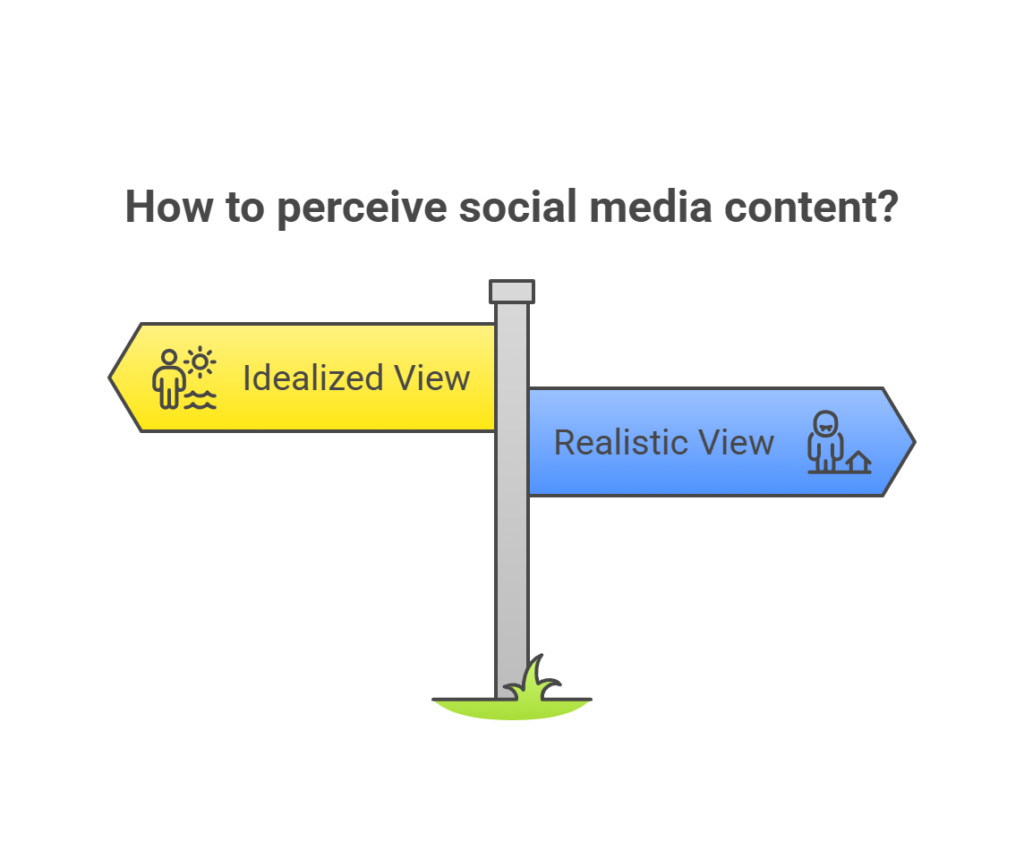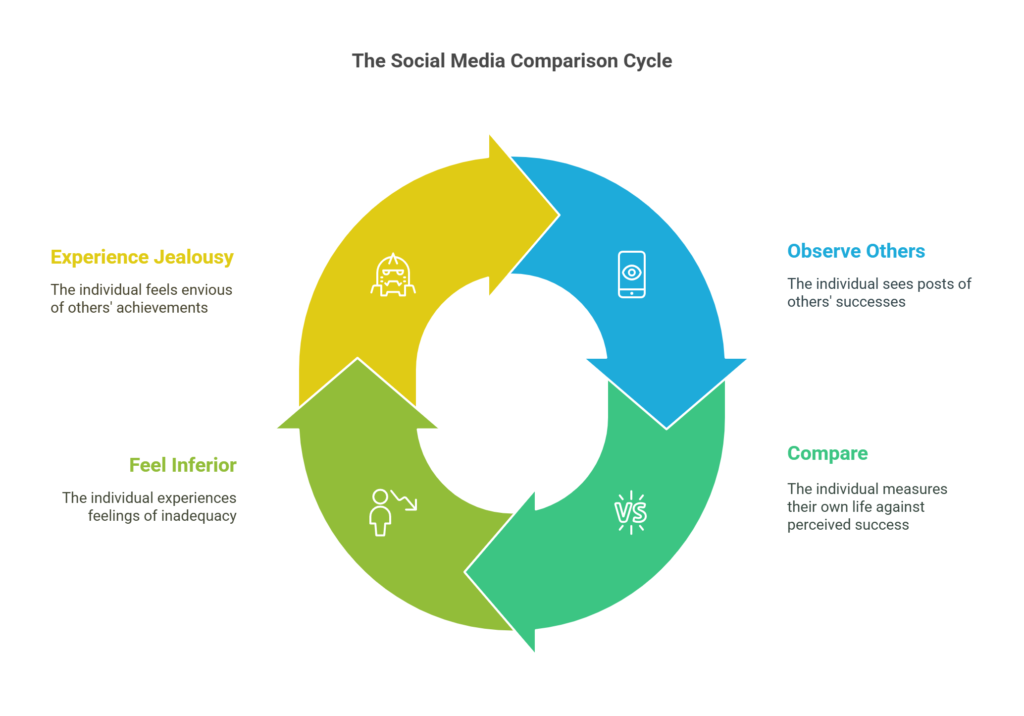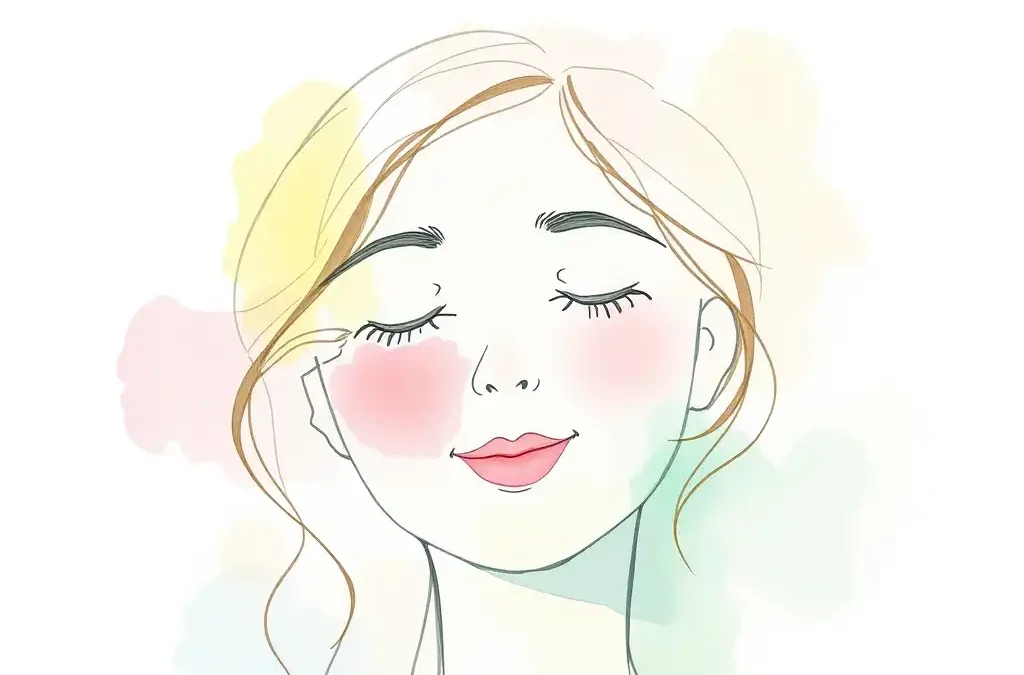Do you ever find yourself scrolling through social media, feeling a little…off? Maybe a twinge of jealousy, or feeling like you don’t measure up? It is a pretty universal experience. We’re constantly seeing images and posts that seem to show ideal lives, amazing bodies, and constant happiness. But it’s important to remember that social media rarely shows the full, messy reality. It’s often a carefully created show, designed to present a certain image. This difference between the online space and our everyday lives can really mess with our self-esteem. This article takes a look at how social media affects how we see ourselves, why it’s so easy to get stuck comparing ourselves to others, and, what steps you can actually take to protect your mental well-being online. We’ll go over strategies for using social media mindfully, being a more critical viewer, and building up a stronger sense of self that isn’t dependent on online approval. Get ready to approach the world of social media with greater awareness and a healthy dose of self-compassion.
Understanding the Curated Nature of Social Media
Social media apps, by how there are built, encourage people to put their best foot forward. This isn’t inherently a bad thing; it’s natural to want to share good stuff and achievements. The trouble starts when we forget that what we’re seeing is edited, not a complete or accurate reflection of a person’s life.

The Highlight Reel Effect
Most people on social media present their “best-of” moments—the amazing trips, job wins, happy selfies, and perfect-looking relationships. They are way less likely to post about ordinary days, personal problems, mistakes, or times they feel down. This creates a skewed version of reality, where it appears everyone else is living some ideal life, and we are not. We end up comparing our full, messy lives, with all of the good and bad, to other people’s carefully selected high points. It’s a bit like comparing your practice footage to someone else’s final, polished movie—it is not a fair or accurate comparison. This fuels lower self-worth and feelings of not being good enough. Some research have shown a direct relationship between a lot of social media use and rising levels of sadness and anxiety, especially among young people. The continuous exposure to idealized versions fuels self-judgment and social comparison.
Filters, Editing, and the Pursuit of Perfection
Beyond just choosing what content to share, the photos and videos we see are often heavily filtered, edited, and changed. Apps make it simple to smooth out skin, change body shapes, add light, and improve features, which creates an unrealistic idea of beauty. The chase after this digital perfection can be really harmful to our self-image. We start thinking these changed images are a realistic goal, and we can feel pressured to fit those impossible standards. This can cause body image problems, low self-confidence, and always feeling like we’re not “enough.” We must to remember that a lot of what we see online isn’t real, and that chasing an artificially improved look is a no-win situation. The person we compare ourselfs to online doesn’t even reflect their true, offline selves all the time.
The Psychology of Social Comparison on Social Media
Humans are social beings, and we naturally look at others to see how we’re doing. It’s how we track our progress, figure out our place, and learn from others. Social media, amplifies this habit, giving us constant comparisons right at our fingertips.
Upward Social Media Comparison and Its Consequences
On social media, we mostly see examples of upward social comparison—comparing ourselves to people we think are “better” than us in some way. It might be in terms of looks, money, job success, relationships, or anything else. Sometimes, looking up to others can motivate us to improve. Usually, it just leads to feelings of envy, not feeling good enough, and low self-worth. Always seeing people who seem to have everything perfect can make us feel like we’re behind or not meeting some made-up standard. The curated style of social media makes this worse, because we’re almost never seeing the full, complex truth of these people’s lives. This constant flow of seemingly ideal lives can wear down our self-belief and lead to a negative self-view.

The Role of Algorithms and Echo Chambers
The algorithms that run social media play a big part in shaping what we experience and fueling social comparison. These systems prioritize content that will keep us looking, often showing us more of what we’ve already engaged with. This can lead to “echo chambers,” where we mainly see content and ideas that repeat our existing thoughts and opinions, positive or negative. If we’re already feeling bad about ourselves, the algorithm might accidentally show us more content that increases those feelings, resulting in a downward spiral of self-doubt. It also makes it harder to see a balanced view of reality, because we’re less likely to come across things that challenge our view or show the whole range of human experience.
The Illusion of Popularity and Social Media Validation
Social media frequently links likes, comments, and follower counts to how popular and accepted someone is. This can create pressure to always look for outside approval, basing our feeling of worth on the number of interactions we get. When posts don’t receive the reaction we hope for, it can lead to feelings of being rejected, disappointment, and lower self-esteem. It’s critical to keep in mind that online measures aren’t a true reflection of our value. Chasing online approval can be a never-ending game, because there will always be someone with more followers or likes. Real self-worth has to come from the inside, not from outside sources.
Practical Strategies for Protecting Your Self-Esteem on Social Media
Dealing with the complicated world of social media needs a mindful and intentional plan. It’s not about totally quitting, but about finding ways to use it that help, instead of hurt, our mental well-being.
Practicing Mindful Social Media Consumption
Mindfulness means paying attention to right now, without judging. Apply this idea to your social media use by noticing your thoughts, feelings, and reactions as you scroll. Notice when you start feeling envious, not good enough, or worried. Ask yourself, “How does this content make me feel? Is this helping me, or is it making me feel bad?” This awareness is step one to making intentional choices about how you use social media. Think about setting time limits for using it, or scheduling specific times to check, instead of constantly checking because of notifications. Regularly take breaks from social media, even short ones, to let your mind rest and reconnect with the real world.
Curating Your Media Feed and Following Consciously
Control your social media experience by intentionally choosing who you follow. Unfollow accounts that often cause bad feelings, promote unrealistic standards, or just generally make you feel down. Be picky about who you follow! Choose accounts that inspire you, teach you something, or simply make you happy. Follow people who are genuine, share a variety of experiences, and share positive messages. You can shape your own online space. You don’t have to just take whatever the algorithm gives you. Pick content that matches your values and helps your well-being.

Focusing on Real-Life Relationships and Activities
Social media should be an addition to, not a replacement for, real-life interactions. Make a point to focus on face-to-face relationships and activities that you enjoy. Spend real time with people you care about, do hobbies you love, get involved in your local area, and do things that make you feel positive about yourself. The happier you are in your offline life, the less you will look for approval or compare yourself to others online. Strong, real-life support can help protect you from social media’s bad effects, giving you a sense of belonging that doesn’t rely on numbers online.
Cultivating Self-Compassion and a Strong Sense of Self
Self-compassion is treating yourself with the same kindness, understanding, and support that you’d give a close friend. Practice self-compassion by recognizing you’re not perfect, accepting your feelings without being hard on yourself, and reminding yourself that you aren’t the only one struggling. Build up a strong sense of self that isn’t based on outside approval. Concentrate on your good qualities, your values, and the things you’ve achieved. Know that your worth as a person is already there—it doesn’t depend on your looks, your stuff, or how popular you are online. The more confident you are in who you are, the less you’ll be affected by social media’s negative parts.
Seeking Professional Support When Needed
If you are having a hard time controlling your social media use or if it’s seriously impacting your mental health, don’t be afraid to get professional help. A therapist can help you build ways of coping, deal with deeper self-esteem problems, and deal with the difficulties of the online world. There’s no shame in asking for help! Taking care of your mental state is just as important as your physical health, and getting support is brave, not weak. Counseling can give you a safe space to explore your feelings and make strategies for a healthier relationship with social media, and with yourself.
Quick Takeaways
- Social media is often a “best-of” reel: What you see online is usually an edited, idealized version of other people’s lives.
- Avoid comparing yourself to others: Remember that you’re often comparing your whole self to someone else’s highlight reel.
- Control your feed: Unfollow anyone who consistently makes you feel bad, and choose to follow those who make you feel good.
- Focus on real life: Put time and energy into in-person relationships and activities that you love.
- Be kind to yourself: Treat yourself with understanding, and know that no one is perfect and everyone struggles sometimes.
- Limit your screen time: Be aware of how much you’re using social media, and avoid using it too much.
- Get help when you need it: Don’t be afraid to talk to a therapist if social media is really getting you down.
Conclusion: Finding Balance in a Digital World
Social media can be useful for communicating, getting information, and finding fun. It’s not all bad, but it takes careful attention to avoid the possible downsides. The trick is to find a good balance between online and offline life, putting your mental health first and building up a strong sense of self that doesn’t need online approval to feel good. By being a critical viewer, carefully choosing who you follow, and focusing on real-world experiences, you can protect your sense of worth and use social media without falling into its negative traps. Remember, you are valuable and worthy just as you are, online and off. Likes, followers, and perfect photos don’t determine your worth.
Frequently Asked Questions
1. How can I know if social media is hurting my self-esteem?
Think about how you feel after using social media. Do you feel worried, not good enough, jealous, or sad? Are you always comparing yourselve to others? Do you feel like your worth depends on likes and comments? If you said “yes” to any of these, social media could be having a negative effect. Keep track of your mood and your social media use to see if there’s a pattern.
2. Do I have to give up social media to protect how I feel about myself?
Quitting social media entirely isn’t always needed or practical. For lots of people, it’s a way to keep in, with friends and family, get news, and follow their hobbies. A better long-term solution is to be mindful in how you use it, and shape your experience to avoid the bad stuff. If social media is constantly making you really unhappy, taking a break or even quitting might be the best choice for you.
3. How can I stop comparing my self to others online?
Keep reminding yourself that you are seeing a “highlight reel,” not the whole truth. Focus on your own good qualities and wins. Unfollow anyone who makes you feel bad by comparison. Cut down on your time on social media and do more real-life stuff you love. It takes practice, but with effort, you can get better at not comparing.
4. What are some good ways to use social media?
Use it to stay in touch with people who share your passions, learn new things, get inspired, and support causes you believe in. Share your own genuine experiences, but don’t base your happiness on getting likes and comments. Be aware of your time and avoid just scrolling endlessly. Use it as a tool to improve your life, not one that makes it worse.
5. Is it ok to edit my pictures before I post them?
Whether or not to edit photos is a personal desicion. It is not necessarily bad to want to look good. It’s a problem when editing is used to make an unrealistic look that fuels self-judgment or makes others feel bad about themselves through comparison. Think about why you’re editing, and how it might affect you and others. Being open and honest is a good guideline – is your edited picture still a fair representation of you?



